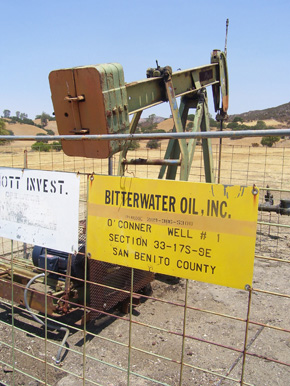A last-minute change to a proposed amendment to San Benito County’s oil and gas well ordinance left residents of Aromas shaking their heads as they left the supervisors’ chambers Tuesday – after commending officials for their willingness to compromise earlier in the meeting.
Supervisors in April directed staff members to increase the requirement for a bond assurance for oil wells to $15,000 per well for up to six wells per user permit, with a cap of $100,000 for more than seven wells. But late in a prolonged discussion of the ordinance Tuesday, Supervisor Jerry Muenzer requested a change in the language of the ordinance that would effectively allow potential oil well drillers to get a $15,000 bond for up to 36 wells.
The ordinance will be brought back May 21 for final adoption.
Muenzer proposed changing language in the ordinance that would refer to “wells” as “facilities,” with one facility referring to up to six wells. He then suggested the bond be approved at $15,000 for up to six facilities per user permit, with a cap of $100,000.
Muenzer said that at the last meeting a representative of the state’s department of conservation noted that the state takes responsibility for wells from “birth to death.”
“We are asking for a $15,000 bond per well or $100,000 for seven or more,” Muenzer said. “I feel this is redundant.”
Supervisor Anthony Botelho, on the other hand, said he did not think the bond level was set high enough to cover a potential clean-up if anything were to go wrong with an oil or gas well in the county.
“There is some rationale to what we are asking for,” he said, adding later in the meeting that if a company cannot afford a $15,000 bond, it should not be in business.
Supervisor Robert Rivas also spoke out against allowing up to 36 wells per $15,000 bond.
“We have a huge problem with the budget – we are lacking money and resources,” he said, noting the county’s sheriff, public works and other agencies would be involved if there were an oil spill that required clean-up. “This is a huge loophole – for what? For the oil industry to maximize their profits?”
Muenzer, Margie Barrios and Jaime De La Cruz, who did not make any comments during the discussion, voted in favor of the ordinance with Muenzer’s proposed change. Botelho and Rivas voted against it.
Muenzer argued that the bond money wouldn’t go into the general fund so the supervisors should not look at the issue as a budget problem. He also reiterated that he believed the state would be responsible for any potential clean-up, with county agencies involved just to oversee it.
During the public comment period many residents of Aromas who had first broached the topic of rewriting the oil ordinance in the county said they were content with the compromise before them – when the ordinance included a requirement for a $15,000 bond per well.
Pat Lerman, a member of Aromas CARES, said the draft of the ordinance before the board this week is not the draft they would have created but they were happy with the compromise – before Muenzer’s language was changed the bonding level per well.
“Thank you most for protecting our community,” said Bill Hunter, a San Juan resident. “I don’t understand the need to extract every last drop of oil as soon as possible. … Thank you again for your open minds. We cannot rely on state and federal legislation – it’s just not there.”
After the public comment period, the supervisors continued the discussion of changing the language in the ordinance from wells to facilities, multiplying the number of wells allowed per $15,000 bond.
“We send billions for oil to people who hate our guts,” Muenzer said, of the Middle East and other oil-rich countries. “I do not want to stop oil exploration. I want to make sure this ordinance does not kill oil exploration.”
As Muenzer suggested his change in language, several members of the audience expressed confusion over whether his wording would allow six wells per $15,000 bond or 36 wells. Barrios asked Planning Director Gary Armstrong for clarification, while Armstrong referred her back to Muenzer for clarification.
Muenzer clarified that it would be for up to six “facilities,” or 36 wells.
“I will support this because I think we’ve done everything we can for the environment,” Barrios said. “I support this to make us more self-sufficient as a country.”










